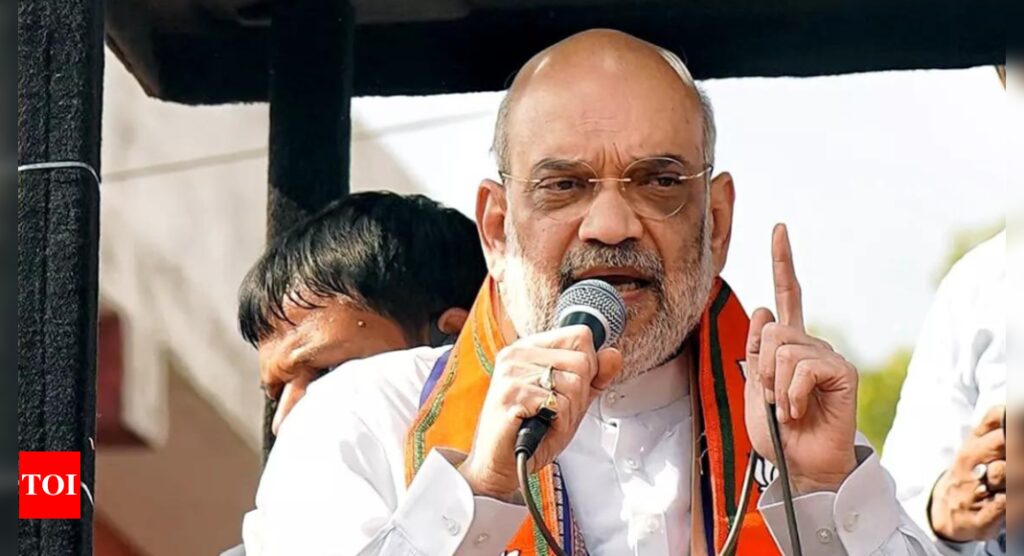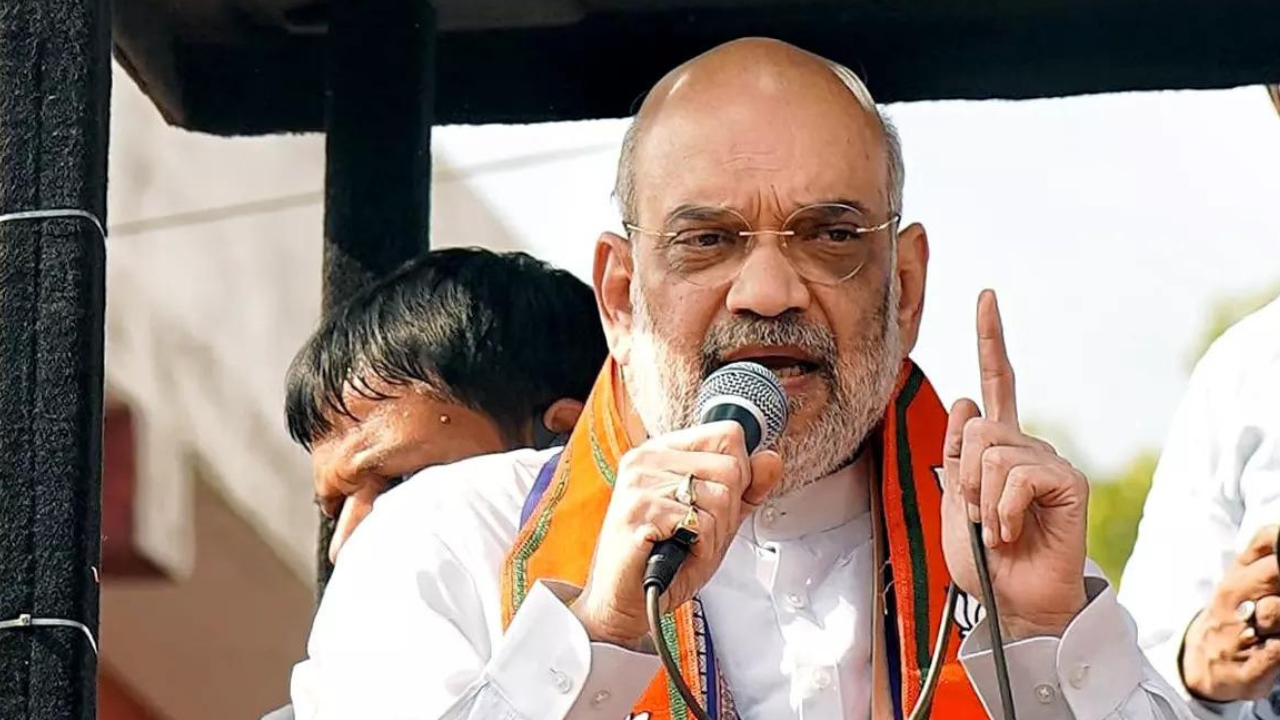[ad_1]
NEW DELHI: Several issued were resolved in the 26th meeting of the Eastern Zonal Council chaired by Union Home Minister Amit Shah in Bihar’s Patna on Sunday.
“The meeting was good and several issues were resolved in the meeting. Committees were also formed for some issues,” Shah told ANI.
Union Home Minister and Minister of Cooperation Amit Shah had chaired the 26th meeting of the Eastern Zonal Council in Patna, Bihar.Bihar Chief Minister Nitish Kumar and senior ministers from Odisha, West Bengal, Bihar and Jharkhand attended the meeting. The secretary of the Inter State Council Secretariat, the chief secretaries of member states, senior officials of state governments and central ministries and departments were also present in the meeting.
In his address, Union Home Minister Shah said that apart from being the cultural capital of the country, the eastern region has also been the centre of many major educational institutions since ancient times. He said that a lot of experiments have taken place in the field of education in the eastern region and even in competitive examinations, children from the eastern region are most successful. The Home Minister also said that the Eastern Region has laid the foundation for the industrial development of the entire country and many patriots from this region have contributed significantly to the redevelopment of the country before and after independence. The region is rich in mineral resources and water, and the eastern states like Bihar, Orissa, Jharkhand and West Bengal provide almost all the mineral resources for the needs of the entire country.
Amit Shah said that Prime Minister Narendra Modi’s vision of strengthening the spirit of cooperative federalism has been realised in the last nine years.
Highlighting the increase in the number of Zonal Council meetings after Narendra Modi became the Prime Minister, the Home Minister said that from 2004 to May 2014, the total number of meetings of the Zonal Councils and their Standing Committees was only 25 and during this period, on average, 2.7 meetings were held every year. But in the last nine years, from June 2014 until now, despite the COVID-19 pandemic, a total of 56 meetings of the Zonal Councils and their Standing Committees were held and an average of 6.2 meetings were held every year. A total of nine meetings have been held so far this year, which includes four meetings of Zonal Councils and five meetings of standing committees. He added that this increase of more than double showcases Prime Minister Modi’s Team India concept.
Addressing the meeting that lasted for about three hours, the Home Minister said that 1,157 issues have been resolved in the meetings of the zonal councils. He said that in the zonal council meetings, differences on political matters should be avoided and efforts should be made to resolve matters in a liberal manner.
Amit Shah said that many issues of national importance have also been included in the agenda of the Zonal Council meetings. These include eliminating malnutrition among children through the Poshan Abhiyan (nutrition campaign), reducing the dropout rate of schoolchildren, and operationalizing Fast Track Special Courts (FTSCs) for speedy investigation and speedy disposal of rape cases against women and children. The facility of banks and Indian Post Payment Bank branches within 5 km of each village, the formation of two lakh new primary agricultural credit societies (PACS) in the country and the strengthening of all existing PACS in the country have also been included.
He said that these issues need to be reviewed every three months at the level of the Chief Minister, Minister and Chief Secretary. Issues related to mining, central financial assistance on some items, construction of basic infrastructure, land acquisition and land transfer, water sharing, implementation of the Direct Benefit Transfer scheme, state reorganization and issues of common interest at the regional level were also discussed in the meeting.
Shah said that in the meeting, all four states–Bihar, Jharkhand, West Bengal and Odisha–made impressive presentations regarding good practises being implemented in their respective states. He said that these good practises will inspire other states to take positive steps. It was informed in the meeting that the land acquisition work for the Hajipur-Sugauli new railway line project has almost been completed. Also, land acquisition work for the Nabadwipghat-Nabadwipdham New Railway Project (15 km) in West Bengal has also started. Additionally, work on the completed section of the Krishnanagar-Nabadwipghat gauge conversion (12.2 km), i.e., Krishnanagar-Amghata (8.30 km), has been commissioned.
Regarding the caste-based survey conducted in Bihar, the Home and Cooperation Minister said that when his party was in power in Bihar, it had supported the caste-based survey. He said the governor also approved the bill. He added that there are some issues regarding caste-based surveys, which he hoped the state government would resolve. Shri Shah said that the Central government never had any intention of creating hurdles in the caste-based survey.
The Union Home Minister said, “Although the role of the Zonal Council meetings is advisory, on the basis of my four and a half years of experience as Union Home Minister, I can say that by giving importance to the meetings of the Council and its Standing Committee, we have resolved many issues. A total of 48 issues were discussed in depth in the 13th meeting of the Standing Committee held on June 17, 2023, out of which a total of 28 issues were resolved by mutual consent after discussion between the Chief Secretaries of the member states and senior officials of the states and the Centre. A total of 21 issues were discussed in today’s meeting”.
“The meeting was good and several issues were resolved in the meeting. Committees were also formed for some issues,” Shah told ANI.
Union Home Minister and Minister of Cooperation Amit Shah had chaired the 26th meeting of the Eastern Zonal Council in Patna, Bihar.Bihar Chief Minister Nitish Kumar and senior ministers from Odisha, West Bengal, Bihar and Jharkhand attended the meeting. The secretary of the Inter State Council Secretariat, the chief secretaries of member states, senior officials of state governments and central ministries and departments were also present in the meeting.
In his address, Union Home Minister Shah said that apart from being the cultural capital of the country, the eastern region has also been the centre of many major educational institutions since ancient times. He said that a lot of experiments have taken place in the field of education in the eastern region and even in competitive examinations, children from the eastern region are most successful. The Home Minister also said that the Eastern Region has laid the foundation for the industrial development of the entire country and many patriots from this region have contributed significantly to the redevelopment of the country before and after independence. The region is rich in mineral resources and water, and the eastern states like Bihar, Orissa, Jharkhand and West Bengal provide almost all the mineral resources for the needs of the entire country.
Amit Shah said that Prime Minister Narendra Modi’s vision of strengthening the spirit of cooperative federalism has been realised in the last nine years.
Highlighting the increase in the number of Zonal Council meetings after Narendra Modi became the Prime Minister, the Home Minister said that from 2004 to May 2014, the total number of meetings of the Zonal Councils and their Standing Committees was only 25 and during this period, on average, 2.7 meetings were held every year. But in the last nine years, from June 2014 until now, despite the COVID-19 pandemic, a total of 56 meetings of the Zonal Councils and their Standing Committees were held and an average of 6.2 meetings were held every year. A total of nine meetings have been held so far this year, which includes four meetings of Zonal Councils and five meetings of standing committees. He added that this increase of more than double showcases Prime Minister Modi’s Team India concept.
Addressing the meeting that lasted for about three hours, the Home Minister said that 1,157 issues have been resolved in the meetings of the zonal councils. He said that in the zonal council meetings, differences on political matters should be avoided and efforts should be made to resolve matters in a liberal manner.
Amit Shah said that many issues of national importance have also been included in the agenda of the Zonal Council meetings. These include eliminating malnutrition among children through the Poshan Abhiyan (nutrition campaign), reducing the dropout rate of schoolchildren, and operationalizing Fast Track Special Courts (FTSCs) for speedy investigation and speedy disposal of rape cases against women and children. The facility of banks and Indian Post Payment Bank branches within 5 km of each village, the formation of two lakh new primary agricultural credit societies (PACS) in the country and the strengthening of all existing PACS in the country have also been included.
He said that these issues need to be reviewed every three months at the level of the Chief Minister, Minister and Chief Secretary. Issues related to mining, central financial assistance on some items, construction of basic infrastructure, land acquisition and land transfer, water sharing, implementation of the Direct Benefit Transfer scheme, state reorganization and issues of common interest at the regional level were also discussed in the meeting.
Shah said that in the meeting, all four states–Bihar, Jharkhand, West Bengal and Odisha–made impressive presentations regarding good practises being implemented in their respective states. He said that these good practises will inspire other states to take positive steps. It was informed in the meeting that the land acquisition work for the Hajipur-Sugauli new railway line project has almost been completed. Also, land acquisition work for the Nabadwipghat-Nabadwipdham New Railway Project (15 km) in West Bengal has also started. Additionally, work on the completed section of the Krishnanagar-Nabadwipghat gauge conversion (12.2 km), i.e., Krishnanagar-Amghata (8.30 km), has been commissioned.
Regarding the caste-based survey conducted in Bihar, the Home and Cooperation Minister said that when his party was in power in Bihar, it had supported the caste-based survey. He said the governor also approved the bill. He added that there are some issues regarding caste-based surveys, which he hoped the state government would resolve. Shri Shah said that the Central government never had any intention of creating hurdles in the caste-based survey.
The Union Home Minister said, “Although the role of the Zonal Council meetings is advisory, on the basis of my four and a half years of experience as Union Home Minister, I can say that by giving importance to the meetings of the Council and its Standing Committee, we have resolved many issues. A total of 48 issues were discussed in depth in the 13th meeting of the Standing Committee held on June 17, 2023, out of which a total of 28 issues were resolved by mutual consent after discussion between the Chief Secretaries of the member states and senior officials of the states and the Centre. A total of 21 issues were discussed in today’s meeting”.
[ad_2]
Source link











More Stories
Congress replaces Kamal Nath, names an OBC as Madhya Pradesh chief | India News
Fire breaks out in ITBP camp in Srinagar; none hurt | India News
Parliament Security: Co-villagers give clean chit to Lalit Jha, parents to move court | India News